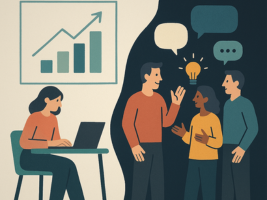You have probably heard some people insist that they would learn better if only the content was presented to them as a video.
You might have had that fidgety little girl in class who refused to sit down until you gave her something to actually do.
I too often find myself leaning towards content presented in text form over pure audio and video. In fact, I’ve turned down opportunities to learn when something is presented in video or audio form, even if it promises highly relevant and interesting content from a good source. With TED talks, I almost always prefer to read the transcript than watch the video. And for podcasts, I would rather fall back on reading the corresponding blog, if that option is available.
But wait, doesn’t this sound too eerily like an argument for learning styles?
Well, no and yes.
No, since I am not making a case for learning styles.
Yes, because I have used the learning styles example to illustrate my point about individual learner needs.
As a learning practitioner, I love science and the scientific method. When I’m breaking my head over a design-related problem, I turn to science for answers. Google Scholar can yield copious amounts of text in response to every possible question you may have on the problem. And when this gets too much to handle, I look towards research translators in our field who have kindly made the effort to whittle it all down for us to read and understand.
But what of the myriad decisions we make on a day-to-day basis, in terms of health, nutrition, what’s good for the body, what causes the least harm to the environment, and so on? We don’t have the time or the bandwidth to educate ourselves on the latest in scientific research in each area before we make a decision.
Also sometimes, my personal experience tends to be at loggerheads with what the science says. For example:
“Why does it not work for you? It’s a proven method that’s worked 99% of the time!”
“This medicine has been shown to have an efficacy of 97%.”
Alas, I often find myself among the outliers… among those who fall in that 1%, for whom the solution does not work.
So how do I reconcile?
Basically, I follow a two-pronged approach – one for the practitioner (or the designer) and one for the person (the user).
As a practitioner, I continue to diligently follow the scientific approach to the best of my ability, valuing empirical evidence over personal anecdotes. I will continue to look for answers in a systematic way, incorporating new learnings in my work as I go along.
As an individual, I can relax a bit (or a lot), leaning more towards personal experiences and what they have taught me, rather than trying to follow a strictly scientific approach.
So, while I advocate against using learning styles to design any solution, I’m happy as an individual to pick and choose learning that caters to my individual preferences. Until I find a way to marry the two approaches, of course.
Maybe science will provide an answer to that too, in due time.
Written by Srividya Kumar, Co-Founder @ Learnnovators






